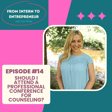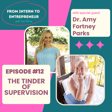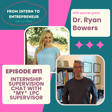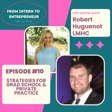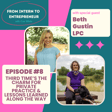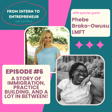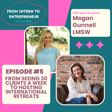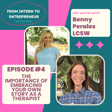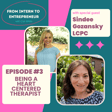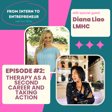
Episode 15 - Burnout Is A Real Thing In Grad School with Gabrielle Juliano-Villani
Click here to join the From Intern To Entrepreneur Facebook community!
From Intern to Entrepreneur is the podcast for counseling graduate students (and other grad students in mental health fields) to start planning their journey to private practice while they're still in graduate school! Host, Cori White, started planning her journey while she was still in her graduate program and it paid off BIG to start planning EARLY.
In this episode of From Intern to Entrepreneur, Cori interviews Gabrielle Juliano-Villani about her area of expertise - BURNOUT!
More about Gabrielle:
Gabrielle Juliano-Villani is a licensed clinical social worker, consultant, coach, entrepreneur and educator based in Sarasota, Fl. She has been in the mental health field for over a decade specializing in stress, chronic health conditions, and trauma. After scaling her group practice to 7 figures and realizing her own burnout in 2021, she sold her thriving group practice and made it her mission to educate others on the impact stress has on our everyday lives. Gabrielle pulls from her experience as an EMDR and Polyvagal Informed therapist to utilize mind/body approaches to help others implement everyday strategies to manage stress and live their best lives. Gabrielle is an international speaker, retreat leader, and has been featured in Authority Magazine, The Daily Om, Bustle, and the Everyday Woman TV Network. When she's not working, Gabrielle is teaching Zumba, surfing, or reading a psychological thriller at the beach
Connect with her:
tiktok.com/@gabriellejulianovillani
youtube.com/@gabriellejulianovillani
Gabriellejulianovillani.com
Medicareconsultingfortherapists.com
https://www.linkedin.com/in/gabriellejulianovillani/
https://www.facebook.com/groups/createanabundantgrouppractice
